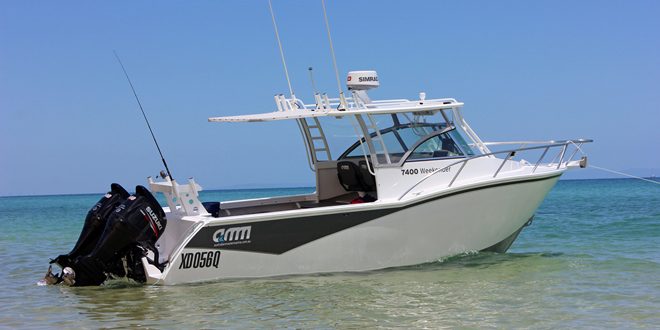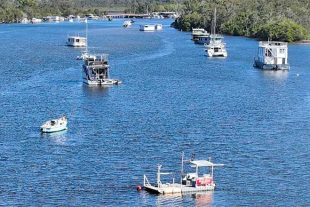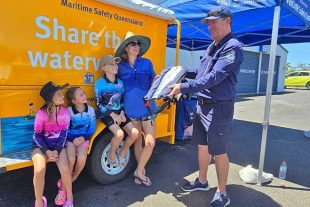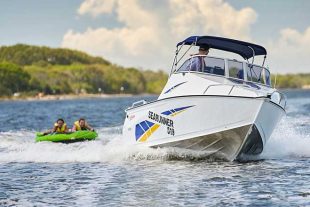Then, armed with a commerce degree, well established in his new career and somewhat frustrated about having been boatless for far too long, Shaun sat down and started thinking about what sort of boat would suit the needs of his young family and himself. It could not have been an easy decision, with too much knowledge about too many different types of boats. Brought up in a fishing family, Shaun had been in and around boats ever since he could remember, before progressing to his own boats.
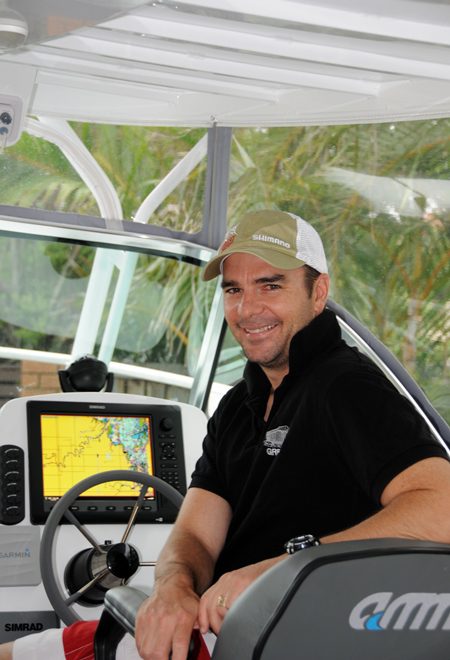
“I started out with little 10-footer tinnies, then upgraded to 12 footers and then a 16’ aluminium centre console,” Shaun said.
“I also did a lot of professional fishing in catamarans – 18, 23 and 28 footers as well as a 48’ Randell.
“But most of my fishing career was out of a large plate boat – a 22’ Pacific Custom Craft, particularly for spanner crabbing between the Gold and Sunshine coasts.
“I also did a lot of professional work in an 18’ Shark Cat.”
Tinnies, large plate alloy and fibreglass vessels and plenty of catamarans; the options were many and varied.
“I originally was looking at 23’ catamarans because you do get a good ride in them,” Shaun said.
“But I also was looking for more room up front for the kids (Shaun has three of them) or for a couple of adults to sleep.
“I also wanted to keep the whole rig under the three-tonne mark, which is difficult to achieve with that size catamaran.
“Then when I looked at Australian Master Marine’s large plate alloy boats – well, there was no comparison – they’re a bigger boat overall.”
Shaun began to zero in on an AMM Weekender 7400.
“My biggest concern was getting that really good ride for the kids – they’re young and I didn’t want to put them off boating by them being knocked around,” Shaun said.
“I know what big plate boats are typically like – they’re good, they get out there, they bobble around a bit, they have high sides; they’re a good, safe boat, but they do tend to lean into the wind and can knock you around a bit.
“I was a bit concerned about that.
“But then I had heard a few stories about how far AMM has come with the deeper vee hulls – it’s easy to see the difference between old plate boats and the current AMM Weekender, which has a deep vee from a 20-degree deadrise.
“So I took this hull out with a couple of 175hp Suzukis on the back with Matt (Matthew Thomas from AMM) in about 20 knots of northerly wind on the bay.”
The boat was fitted with trim tabs and Shaun was quite taken aback by the ride.
“It was impressive,” he said.
“The new AMMs are also a fair bit heavier than the old boats I was used to.
“I think it’s a combination of things like the 6mm plate they use in the hull and they also build them really heavy down low – they’re quite heavily framed.”
Convinced that AMM had pushed the boundaries of improvement, Shaun placed his order.
“Since taking delivery, I’ve had it outside the South Passage Bar in 25 and 30-knot wind,” he said.
“Off Amity Point (at the southern end of Moreton Bay’s notorious South Passage Bar) I deliberately turned it around and started running back with the waves on the stern quarter in about a metre and a half of sea.
“I was very impressed; there was no broaching at all.
“I also ran it into a head sea with 25 knots of northerly blowing and a metre and a bit of chop.
“In many other boats, you would get your knees broken, but the 7400, it just rocketed across with no problem at all.”
Shaun has powered his AMM Weekender 7400 with a pair of 140hp Suzuki outboards, which, reflecting his commercial fishing background, run off two separate 240-litre fuel tanks, two independent water separators and separate wiring looms to create a ‘fail safe’ backup system.
Early consumption figures show Shaun’s Weekender covers about 1.4km per litre when run between 3800 and 4200rpm, which translates to roughly 25 or 26 knots with three adults and a three-quarter load of fuel.
Shaun opted to have the below-floor areas foam filled for extra safety and he specified the hardtop to be 300mm longer than standard.
He also ordered a removable hardtop extension and lockable sliding cabin door.
The electronics array gives an insight into his days as a pro fisherman, with a 12” Simrad NSE plotter and multi-function display; Simrad 4G radar; separate 1kW Airmar SS264 50kHz and 200kHz transducers (they’re magic he says); a Furuno 587 sounder; twin Garmin instrument readouts for each engine, with both displaying information in digital and analogue formats; and a sonic hub for entertainment.
There’s also a 100-litre underfloor freshwater tank, live bait tank and a deck wash, insulated 160-litre kill tank that doubles as a fish box, and built-in Esky under the port side extended seat box.
“Being in boats all my life, I know what ultimately really matters out there,” Shaun said.
“I see people stacking their boats up with all sorts of things, but going back to my commercial roots, I only need things that do work.”
 Bush ‘n Beach Fishing Magazine Location reports & tips for fishing, boating, camping, kayaking, 4WDing in Queensland and Northern NSW
Bush ‘n Beach Fishing Magazine Location reports & tips for fishing, boating, camping, kayaking, 4WDing in Queensland and Northern NSW

